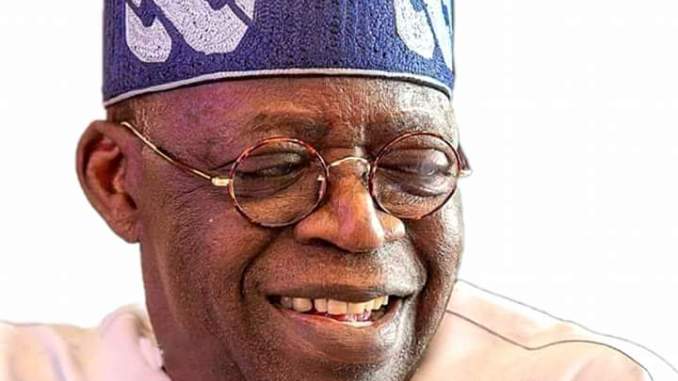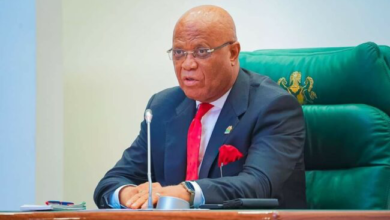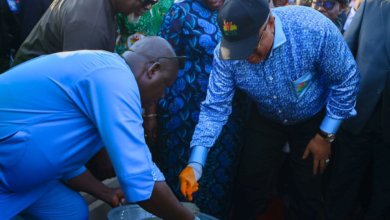High interest rate, foreign loans: Tinubu canvasses way out

National Leader of the All Progressives Congress (APC) Bola Tinubu has described Nigeria’s current financial system as obsolete, just as he cautioned on the nation’s borrowing spree.
In a statement he personally signed and made available to journalists Sunday, Tinubu insisted that the resultant high interest rates regime being implemented by the Central Bank of Nigeria (CBN) remains a fundamental drag on national economic growth.
Nation’s foreign loans
Nigeria’s income has shrunk considerably following crash in the price of crude oil, which has fallen to just a little above $20 per barrel from about $57 in January.
Presently, Nigeria’s Debt Management Office (DMO) puts the nation’s debt at N27.401 trillion as at December 2019, Blueprint reports.
Tinubu speaks
Speaking on the foreign borrowing and other related fiscal issues, the APC national leader stated that the current nation’s financial system was antithetical to growth, saying it was originally structured to serve the colonialists who wanted a highly centralised system that provided little chance of prosperity for indigenous business beyond that which the colonial master would allow.
“Though the years have passed since the end of the colonial era, the basic structure of that old financial system remains intact. The system has not kept pace with the needs and challenges of our evolving nation,” he said.
In the statement titled: ‘The case against high interest rates in time of contagion”, Tinubu noted that over time, high interest rate continues to stifle local investments in the economy.
He said the high interest rate financial model runs contrary to the ideals of a progressive democracy to which Nigeria aspires.
He said: “The Central Bank of Nigeria has demonstrated its financial agility by establishing a growing number of special financing programs for various industries and sectors of the economy. While these programmess look good at first glance, they also expose important contradictions in the CBN’s position. The special schemes are an implicit admission that normal rates stifle investment borrowing and thus suppress the economy.
“The extraordinary schemes would not be required if the general interest rate was at a proper level. By establishing the special programs, the CBN attempts the impossible. On one hand, it defends the general rate as prudent. On the other, it proliferates special exceptions in order to spur investment borrowing that the general rate has heretofore stifled.
“This complex CBN rear-guard action does not serve the greater purpose. It merely prolongs the inevitable: We must retreat from high interest rates if we want investment borrowing to attain levels that actually increase private-sector growth and job creation.
“This point bears repetition. If the financial sector functioned properly, servicing the needs of the economy in general, there would be no need to constantly resort to specialised sectoral plans (one for this industry, another for that industry and so on) for concessionary lending below regularly available rates of interest. Each such scheme is evidence that the overall financial system is fragmented in a manner that artificially reduces investment and the positive consequences increased investment has on growth, production and employment.
“The schemes are akin to a homeowner who, confronted with severe structural damage, commissions a fresh coat of paint to obscure the obvious structural flaws. Just as the homeowner should focus on fixing the core problem to prevent the house from crumbling, the Bank should do the one great thing it can do to free the economy from an unpayable burden. It should reduce interest rates.
“The modern global economy is built on credit. Prosperous nations have built success based on the sustained ability to use credit to generate high levels of domestic investment as well as allow for significant consumer financing. Unlike two centuries ago, most business investment is not derived from the self-generated funds of the businessman or investor. Investment comes mainly from bank loans.
However, the current rate of interest in Nigeria prohibits most normal business investment. Thus, the productive sector stagnates as innovation and creative endeavour are discouraged. Employment and aggregate demand are dragged down. The economy becomes a slave to a negative, impoverishing dynamic.”
On foreign borrowing
Tinubu further said the rate at which the country was borrowing would be a drain on Nigeria foreign income on the long run. He added that over-reliance on foreign borrowing to run the economy would further deplete Nigeria’s dwindling resources.
He said: “However, we have become too reliant on foreign borrowing. In our case, we have created a highly imbalanced and imperfect economy. On one hand, high rates are used to scare domestic investment borrowing thus undermining income, production and consumption. On the other hand, high interest rates are used to attract foreign creditors who must be repaid with an increasing percentage of our intake of dollars. This indifference to domestic investment yet open encouragement of foreign financial speculation is a rather odd mis-arrangement that makes little sense if the true objective is to grow the overall economy.
“Given the inescapable dynamics of compound interest, a dollar borrowed today will have to be repaid with 2 dollars some point in the future. This drains our reserves to the benefit of foreign creditors. If we must borrow dollars better to first borrow from our own people, then the DFIs (World Bank, etc.) at concessional rates. We should only borrow from the foreign private sector as a very last resort.”
He urged the Apex Bank to stop supporting the Naira and allow the forces of supply and demand to run their course.
The former governor also noted that the government at the end of the day was spending more to defend the Naira at the detriment of investment and job creation.
“To maintain the exchange rate, we must sacrifice both naira and dollars that could have been invested in strengthening our productive capacity and job creation.
Instead of bolstering the economy, we give these financial resources to international finance arbitragers who care little for our well-being, who invest little in our productive economy and who gain too much influence over our national economy as insensitive creditors.
“We have to progressively pay them increasing amounts just to sate their demands while giving our population relatively less. As oil revenues lose their potency to carry the economy, this financial model becomes an increasingly heavier albatross impeding economic growth. We remain too import-reliant even though our supply of funds to buy imports dwindle. We seek to maintain a strong currency because of this import reliance and because of national pride. However, this reliance drains funds to support the exchange rate that could be better invested in strengthening our productive capacity,” he said.
He urged the Apex Bank to lower the high interest rate that is presently impeding investments.
“At this moment, we need business and industry to take up the slack generated by the weakening of the oil sector. However, the productive economy is barred from this needed increase in activity because the high interest rates, along with an unreliable power supply, combine to form a steep obstacle to sufficient real-sector investment, growth and productivity,” Tinubu said.





